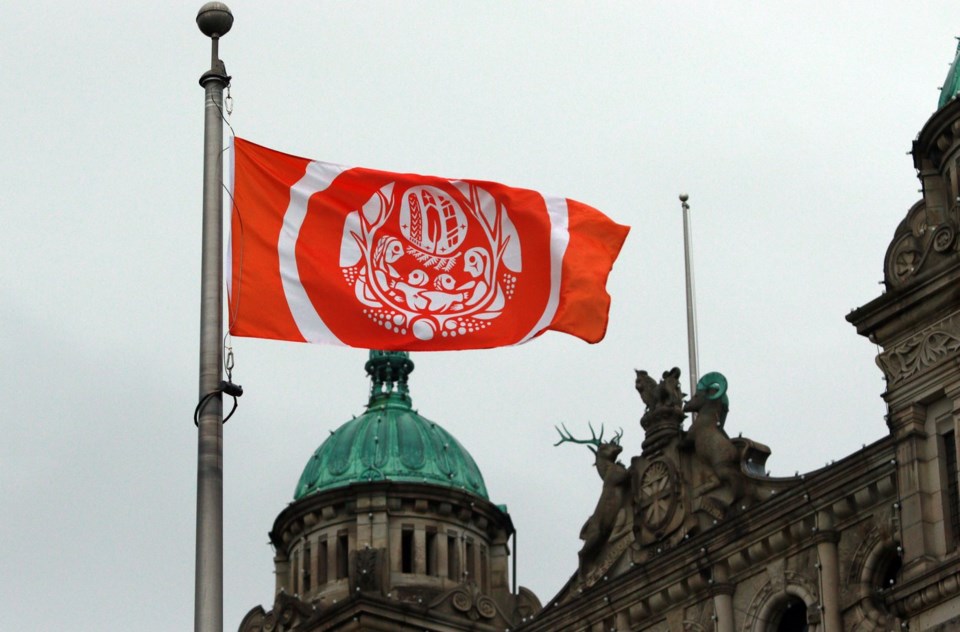SECHELT — An 18-month investigation at a former residential school site in British Columbia's Sunshine Coast has found more evidence of children who disappeared there, the area’s First Nation says.
The shishalh First Nation in Sechelt, B.C., said in a release Friday that 41 "additional unmarked graves" had been found as a result of a search with ground-penetrating radar in the area around the St. Augustine’s Residential School site.
It said the discovery brought the number of suspected graves at the site to 81, after initial findings that were announced in 2023.
"Today is a day of loss for our community and for our families," said Chief Lenora Joe in a video statement.
"These findings and the areas scanned were all driven by the stories and the memories of our survivors, our elders and family members who have been carrying these truths and burdens with strength for many, many years."
The B.C. Legislature's flag would fly at half mast until sunset on Sunday, assembly staff said in a social media post after the First Nation's announcement.
The post said this was "to honour the shishalh Nation, and the survivors, families, and communities impacted by trauma and loss at the former Sechelt residential school."
First Nations communities have tended to use careful language when announcing the findings of radar searches, ranging from anomalies and areas of interest to possible graves, but the shishalh statement said graves at St. Augustine's were "identified by archeologists."
In April 2023, the nation announced the discovery of what it believed to be 40 unmarked grave sites on and around St. Augustine’s. It said at the time that depending solely on ground-penetrating radar for data would be inaccurate and inconclusive, due to the site of St. Augustine's being in the middle of Sechelt and having been disturbed and developed.
On Friday, the shishalh Nation declined to offer anyone for an interview, saying it wanted space and privacy.
"As we release this news, we want to protect our people and put our community and other First Nations whose children are directly impacted and connected to this in the forefront," Joe said in a video statement.
"We are not taking ownership of this trauma, because that was done to us. But we are taking ownership of our healing, our message and our future."
The nation said children from its community as well as 53 other nations from as far away as Saskatchewan were at the residential school, and it had been working with them in the search for possible graves.
This is the latest in a series of statements from First Nations around the province after the Tk'emlups te Secwepemc First Nation in Kamloops announced the detection of more than 200 potential unmarked graves by ground-penetrating radar in May 2021.
Joe said her nation is "deeply saddened" by the latest discoveries, but the results of ground-penetrating radar scans weren't surprising to community members.
“We have always believed our elders. This wasn’t a school, it wasn’t a choice, and the children who attended were stolen,” Joe said. “We didn’t need the (ground-penetrating radar) to prove this happened; we always had enough proof to know.”
The National Centre for Truth and Reconciliation at the University of Manitoba says St. Augustine's, in Sechelt, B.C., operated between 1904 and 1975 under Roman Catholic administration with federal funding from 1905 onward.
The first school building burned down in 1917, and a newer structure was opened in 1922 before being destroyed by another fire in October 1975, just months after it had been closed.
The centre said parents had protested issues ranging from the quality of education to poor diet and harsh discipline at the school in 1923, withdrawing their children from the facility.
Joe said in her statement that survivor accounts reported children allegedly being taken by staff into nearby forests at night and not returning.
“Survivors have carried these horrors, and the disappearances of their siblings, cousins, and peers, in addition to their own experiences,” Joe said.
The Indian Residential Schools Resolution Health Support Program has a hotline to help residential school survivors and their relatives suffering with trauma invoked by the recall of past abuse. The number is 1-866-925-4419.
This report by The Canadian Press was first published Aug. 15, 2025.
The Canadian Press



